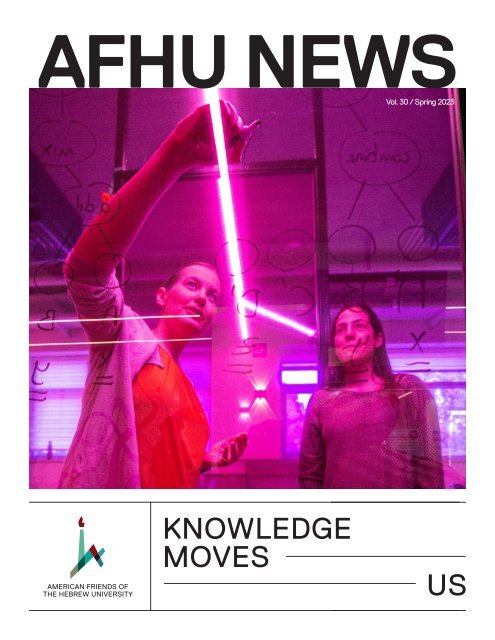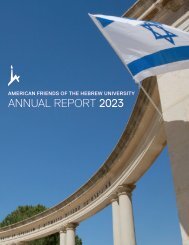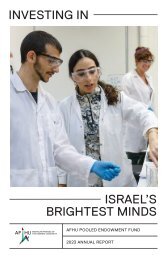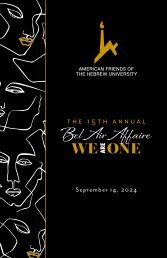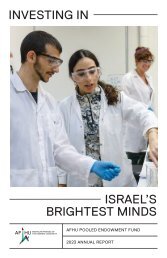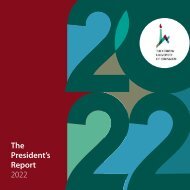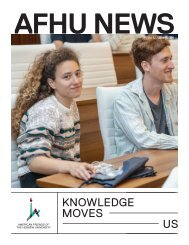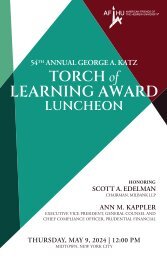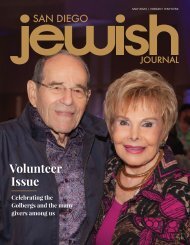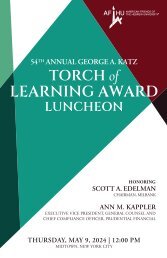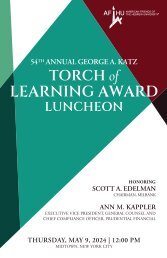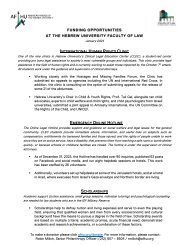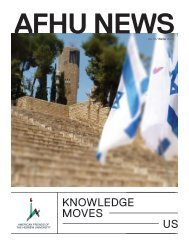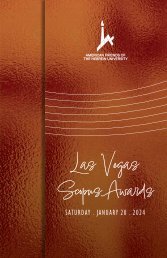You also want an ePaper? Increase the reach of your titles
YUMPU automatically turns print PDFs into web optimized ePapers that Google loves.
<strong>AFHU</strong> NEWS<br />
Vol. 30 / <strong>Spring</strong> <strong>2023</strong><br />
KNOWLEDGE<br />
MOVES<br />
US
PAGE 2<br />
AMERICAN FRIENDS OF THE HEBREW UNIVERSITY<br />
<strong>AFHU</strong> NEWS VOL. 30 PAGE 3<br />
<strong>AFHU</strong> National Leadership<br />
Letter from Leadership<br />
PRESIDENT<br />
TREASURER<br />
HONORARY DIRECTORS<br />
Dear Friends,<br />
Clive Kabatznik<br />
CHAIR OF THE BOARD<br />
Marc O. Mayer<br />
VICE CHAIR OF THE BOARD<br />
Richard S. Ziman<br />
VICE PRESIDENTS<br />
Kenneth L. Stein<br />
Ronald M. Zimmerman<br />
HONORARY PRESIDENTS<br />
Stanley M. Bogen<br />
Marc O. Mayer<br />
George A. Schieren<br />
Daniel I. Schlessinger<br />
Ira Lee Sorkin<br />
NATIONAL CAMPAIGN CHAIR<br />
James Matanky<br />
Joshua M. Olshin<br />
ASSISTANT TREASURER<br />
Michael S. Kurtz<br />
HONORARY VICE<br />
PRESIDENTS<br />
Ernest Bogen<br />
Rita Bogen<br />
Michael G. Jesselson<br />
Herbert L. Sachs<br />
Charles A. Stillman<br />
Stanley R. Zax<br />
SECRETARY<br />
Pamela N. Emmerich<br />
ASSISTANT SECRETARY<br />
Richard D. Weinberg<br />
Alan Fiske<br />
Charles H. Goodman<br />
Brindell Gottlieb<br />
Brad Karp<br />
Ellen Klersfeld Hechtman<br />
Marla Lerner Tanenbaum<br />
Mark Vidergauz<br />
HONORARY CHAIRS<br />
OF THE BOARD<br />
Stanley M. Bogen<br />
Michael S. Kurtz<br />
George A. Schieren<br />
Daniel I. Schlessinger<br />
Ira Lee Sorkin<br />
Whether it’s been cold and snowy or wet<br />
and windy, our long winter has now yielded<br />
to spring, and <strong>AFHU</strong> <strong>News</strong> reflects the<br />
upcoming season of new hopes and new<br />
beginnings.<br />
This issue includes news of <strong>AFHU</strong>’s future<br />
and its recent past, with an introduction<br />
to participants in the second cohort of our<br />
highly successful LEAD program and a recap<br />
of the Palm Beach Scopus Award Gala, where<br />
CEO Emerita Beth McCoy was fêted. <strong>News</strong><br />
of alumni activities, recent missions to Paris<br />
and the UAE, new directions in dentistry,<br />
and the story of the struggles and progress<br />
of Iraqi Jews are included in our stories and<br />
donor profiles. Also included are introductions<br />
to some of <strong>AFHU</strong>’s newest staff and, of<br />
course, this issue brings you the latest<br />
updates on the innovations flowing from the<br />
Hebrew University of Jerusalem’s globally<br />
recognized research.<br />
Each issue of <strong>AFHU</strong> <strong>News</strong> reflects our<br />
commitment to the world-class academics<br />
and dynamic research found at HU, along<br />
with our support of the important role the<br />
university plays in Israeli society, a role that it<br />
has played since its founding nearly a century<br />
ago.We hope you enjoy this issue of <strong>AFHU</strong><br />
<strong>News</strong> and invite you to share it with friends.<br />
Thank you for your support of <strong>AFHU</strong> and<br />
for sharing our commitment to the Hebrew<br />
University. By working together with our<br />
dedicated partners at HU, we can help build<br />
a brighter future for Israel and a better<br />
tomorrow for people around the world.<br />
With best wishes,<br />
Joshua W. Rednik<br />
Chief Executive Officer
PAGE 4<br />
AMERICAN FRIENDS OF THE HEBREW UNIVERSITY<br />
<strong>AFHU</strong> NEWS VOL. 30 PAGE 5<br />
JOIN US IN JERUSALEM!<br />
6<br />
8<br />
14<br />
<strong>AFHU</strong> STAFF NEWS<br />
SUPPORTER PROFILES<br />
NEWS & UPDATES<br />
28<br />
30<br />
42<br />
PLANNED GIVING<br />
EVENT RECAPS<br />
REGIONAL OFFICES<br />
CONTENTS<br />
CLICK TO VIEW INVITATION
PAGE 6<br />
AMERICAN FRIENDS OF THE HEBREW UNIVERSITY<br />
<strong>AFHU</strong> NEWS VOL. 30 PAGE 7<br />
<strong>AFHU</strong> Names Senior Fundraising<br />
Executive Alison Freed as Chief<br />
Development Officer<br />
Wilhelmina Waldman Joins <strong>AFHU</strong>’s<br />
Northeast Region<br />
Prior to joining <strong>AFHU</strong>, Freed was Executive<br />
Director of Development at Penn Medicine, the<br />
University of Pennsylvania Health System, where<br />
she supervised a 10-person team. Before that, she<br />
served as Senior Director for Fund Development<br />
at the Westchester Medical Foundation.<br />
Previously, she served as Vice President at CCS<br />
Fundraising, a leading fundraising consulting firm<br />
based in New York City.<br />
“I am thrilled to join the <strong>AFHU</strong> team,”<br />
Freed says. “It is exciting to lead a talented<br />
fundraising team and partner with a dedicated<br />
board as we prepare to celebrate the Hebrew<br />
University’s 100th year.”<br />
American Friends of the Hebrew University<br />
(<strong>AFHU</strong>) has appointed fundraising management<br />
executive Alison (Ali) Freed as Chief Development<br />
Officer (CDO). She will report to <strong>AFHU</strong> Chief<br />
Executive Officer Joshua Rednik.<br />
“Ali is uniquely qualified for the new role of Chief<br />
Development Officer at <strong>AFHU</strong> with well over 20<br />
years of experience,” Rednik says. “Her skills as a<br />
major and principal gifts fundraiser coupled with<br />
her management expertise will be of great value<br />
in supporting the mission of Hebrew University.”<br />
Freed has prior experience in the Jewish<br />
community having worked at United Jewish<br />
Communities (now the Jewish Federations of<br />
North America) earlier in her career.<br />
She graduated from Columbia University with<br />
a Master’s Degree in Social Work in 2004<br />
and earned a Bachelor’s Degree in Human<br />
Development and Family Studies from Penn State<br />
University in 1999.<br />
Veteran fundraising executive Wilhelmina Waldman<br />
was appointed philanthropic officer of American<br />
Friends of the Hebrew University’s Northeast<br />
Region. She is located in the New York office.<br />
Waldman has more than 20 years of management<br />
experience specializing in philanthropy and strategic<br />
planning. She works with the existing Northeast<br />
team, reporting to regional executive director Maura<br />
Milles.<br />
“Wilhelmina is a seasoned philanthropic<br />
executive who is an excellent addition to our<br />
Northeast Region team,” says Milles. “We<br />
welcome her to <strong>AFHU</strong> and look forward to her<br />
significant contributions to our organization.”<br />
Prior to joining <strong>AFHU</strong>, Wilhelmina served as the<br />
founding executive director of Well/Beings, a next-<br />
gen nonprofit focused on climate change. Prior<br />
to that, she was Vice President of Philanthropy<br />
for the ASPCA. In addition, Waldman has worked<br />
for a variety of Jewish and Israeli organizations<br />
throughout her career and currently serves on<br />
the advisory board of JIFA (Jewish Initiative for<br />
Animals).<br />
Waldman earned an MBA from New York<br />
University’s Wagner School of Public Service and<br />
a B.A. in International Relations with a focus on<br />
Middle Eastern and Judaic studies from The George<br />
Washington University. She lives with her family in<br />
Glen Ridge, N.J.
PAGE 8<br />
AMERICAN FRIENDS OF THE HEBREW UNIVERSITY<br />
<strong>AFHU</strong> NEWS VOL. 30 PAGE 9<br />
Anonymous, but Not Silent: A Savvy<br />
Philanthropist Discusses the Hebrew<br />
University and Israel<br />
A supporter for more than four decades, a<br />
special, anonymous donor to <strong>AFHU</strong> enjoys a<br />
hands-on approach to philanthropy. “Support<br />
for HU and Israel is a very personal issue for<br />
me. Some may be content to provide financial<br />
support alone, while others may be content with<br />
direct involvement in the university’s work—I<br />
prefer both.”<br />
Our donor began his philanthropic relationship<br />
with the Hebrew University through scholarship<br />
support 40 years ago and recently made<br />
a $1 million donation to Agrinnovation, the<br />
underlying investment fund focused on<br />
agricultural innovations. Launched in 2015 by<br />
Yissum, the university’s technology-transfer<br />
company, Agrinnovation invests in the research<br />
breakthroughs developed at HU’s Robert H. Smith<br />
Faculty of Agriculture, Food, and Environment,<br />
working closely with university scientists and<br />
researchers to thoroughly test the applicability<br />
and scalability of each new discovery.<br />
Over the years, this donor has funded innovative<br />
work beyond agriculture and the environment,<br />
including the medical research of Prof. Nataly<br />
Kravchenko-Balasha, Chief Investigator in the<br />
Laboratory of Biophysics and Cancer Research.<br />
Prof. Kravchenko-Balasha analyzes the molecular<br />
variations between cancerous tumors. Each<br />
person’s cancer grows in its own way; exploring<br />
the individual variations in cell growth can aid<br />
in the development of tumor-specific drug<br />
combinations tailored to fighting specific<br />
malignancies.<br />
Prof. Nataly Kravchenko-Balasha<br />
Our donor has also supported the research<br />
of Prof. Ofra Benny, Head of the Lab for<br />
Nanomedicine and Tumor Microenvironment in<br />
Hebrew University’s Faculty of Medicine. As the<br />
Harry W. and Charlotte Ullman Labov Chair in<br />
Cancer Studies and Director of the Fraunhofer<br />
Project Center for Drug Discovery and Delivery,<br />
Prof. Benny’s research focuses on novel therapies<br />
and drug-delivery systems. By using an approach<br />
which combines bioengineering, nanomedicine,<br />
and theoretical models, her lab designs selective<br />
nano-therapies for cancer targeting, including a<br />
unique “tumor on a chip” for the development of<br />
personalized cancer therapies. This technology<br />
is the basis for a new start-up that will enable<br />
healthcare professionals to select the optimal<br />
medication for each patient.<br />
Prof. Ofra Benny<br />
Prof. Isaiah (Shy) Arkin’s research has also<br />
benefited from our donor’s support. Prof. Arkin<br />
is the Arthur Lejwa Professor of Structural<br />
Biochemistry at the Hebrew University of<br />
Jerusalem Institute of Life Sciences, Department<br />
of Biological Chemistry, as well as HU’s former<br />
Vice President for Research and Development. He<br />
is the Founder and CEO of ViroBlock, a healthcare<br />
solutions company developed with the support of<br />
Yissum. ViroBlock targets and exploits a particular<br />
vulnerability in viruses: ion channels. Channels<br />
are critical components that enable viruses<br />
to regulate salinity and acidity, so inhibiting<br />
ion channels is a promising route to curbing a<br />
virus’s ability to spread infection. ViroBlock has<br />
used their findings to<br />
develop rapid screening<br />
approaches that can<br />
identify inhibitors from<br />
thousands of chemicals<br />
in a matter of weeks<br />
and has already shown<br />
promising results in several<br />
disease such as COVID-19,<br />
Influenza, Zika, and others.<br />
Prof. Isaiah (Shy) Arkin<br />
Whether supporting start-up companies or<br />
university-based research, our donor feels<br />
that universities must look towards the future:<br />
“My work with <strong>AFHU</strong> and HU is just one of<br />
my charitable concerns. I like to be personally<br />
involved, actively participating in promising projects.<br />
Nonprofits need to think like—and act like—a<br />
business in order to prosper. They can no longer rely<br />
on annual contributions, but must engage in short-,<br />
mid-, and long-term planning. Israel lacks natural<br />
resources, except for the most important natural<br />
resource: her people. HU and Israel must encourage<br />
creativity, innovation, and the development of talent.<br />
They need these skills to survive and thrive.”<br />
Advantageous tax planning helps our donor<br />
achieve charitable goals. Donations are made to<br />
a tax deductible Donor Advised Fund (DAF), from<br />
which distributions are directed to causes that<br />
demonstrate a business mindset. It is important that<br />
recipients operate with the goal of becoming selfsufficient<br />
and self-perpetuating. “My philanthropy is<br />
not limited to donating dollars but includes sharing<br />
my business expertise.” While not every financial<br />
need at the Hebrew University is suited for this type<br />
of benefactor/recipient relationship, those that are<br />
provide a win-win situation for this donor.<br />
For those considering support for Hebrew<br />
University, our donor shares: “Giving to HU<br />
through American Friends of the Hebrew<br />
University enables me to pursue my interests in<br />
innovative agriculture, cancer diagnostics, and<br />
cancer prevention. HU not only offers causes<br />
worthy of support, but encourages a business<br />
mindset that helps a good cause develop into a<br />
self-sufficient and self-perpetuating business.<br />
That’s a must—researchers must become<br />
entrepreneurs and launch successful enterprises.”
PAGE 10<br />
AMERICAN FRIENDS OF THE HEBREW UNIVERSITY<br />
<strong>AFHU</strong> NEWS VOL. 30 PAGE 11<br />
Susan Lawi: A Family History of<br />
Supporting Disadvantaged Students<br />
wanted to find the best university to support,<br />
and he was told that HU was the best university<br />
in Israel.”<br />
Susan is deeply satisfied with the good things<br />
that her family’s tradition of generous support<br />
has brought forth. She said: “I am delighted to<br />
meet the scholarship recipients and I am always<br />
touched by the graduation ceremony for the<br />
Ph.D. candidates, held during the annual Board<br />
of Governors meeting in Jerusalem. The young<br />
people are inspiring—especially the many young<br />
women who are graduating with doctorates. It is<br />
very gratifying.”<br />
Region Board of Directors. On her board<br />
experience, Susan said, “You get to meet other<br />
board members, plan events, suggest worthy<br />
honorees, review HU progress and <strong>AFHU</strong> financial<br />
reports. It’s interesting and rewarding—a great<br />
way to meet interesting, important people and a<br />
great way to help HU and Israel.”<br />
For her service to the university and to Israeli<br />
higher education, HU awarded Susan with an<br />
Honorary Fellowship. Unfortunately, she was<br />
unable to visit Jerusalem to receive the honor<br />
at the Mount Scopus campus. Undaunted<br />
by the challenge, Hebrew University and the<br />
American Friends of the Hebrew University<br />
held a presentation event in September 2022 at<br />
Susan’s home. “(Hebrew University of Jerusalem<br />
Vice President for University Advancement and<br />
External Relations) Amb. Yossi Gal came. My<br />
children were there, and Prof. Magdassi attended<br />
via Zoom, as did a student I help support. It was a<br />
special moment. I felt I shared the award with my<br />
father, and I hope to pass the torch of generosity<br />
to my children.”<br />
Susan is not planning to rest on her laurels,<br />
however. She said, “You see, my father really<br />
believed in the power of education to improve<br />
people’s lives. In the future, I’d like to support<br />
students from Ethiopia—there’s a real need<br />
there. Supporting education for disadvantaged<br />
people is just the way I was raised.”<br />
Susan Lawi’s father left her with an important<br />
legacy, one she hopes to pass down to her<br />
children: support for those who are struggling<br />
to better themselves through education. Susan<br />
shared: “My father, Saleh Masri (z”l), was born<br />
in Iraq, and he knew that many of his Jewish<br />
contemporaries had been uprooted from their<br />
homes in Arab countries. He also knew that<br />
those who sought to build new lives in Israel often<br />
faced discrimination. To fight this discrimination<br />
and help them build better futures, my father<br />
started a Hebrew University scholarship fund for<br />
disadvantaged students of Iraqi descent in 1970.<br />
I was proud of my father’s contribution to Israeli<br />
education and, in 2005, decided to continue<br />
his legacy of providing support to students of<br />
Iraqi descent.” As for why Saleh Masri chose<br />
to support HU, Susan commented, “My father<br />
One particularly significant event occurred at a<br />
Board of Governors meeting when Susan asked<br />
to meet a professor of Iraqi descent. She was<br />
introduced to Prof. Shlomo Magdassi. Prof.<br />
Magdassi’s research group focuses on applied<br />
research, with a focus on nanotechnology.<br />
The group formulates inorganic and organic<br />
nanomaterials for application in a variety of<br />
fields including 3D printing, solar energy, and<br />
bio-medical systems, with current projects<br />
including transparent conductive electrodes,<br />
coatings and inks for solar energy applications,<br />
and nanoparticles for bio-imaging and drug<br />
delivery. Speaking of Prof. Magdassi, Susan<br />
added, “I was very impressed and began<br />
supporting his lab—and was delighted to discover<br />
that support from my father had helped Prof.<br />
Magdassi to pursue his studies when he was a<br />
student at HU!”<br />
In addition to her generosity, Susan has served<br />
the university through her membership on the<br />
<strong>AFHU</strong> Board of Regents and the <strong>AFHU</strong> Northeast<br />
Amb. Yossi Gal, Vice President for University Advancement<br />
and External Relations together with Susan Lawi during<br />
the presentation of her Honorary Fellowship.
PAGE 12<br />
AMERICAN FRIENDS OF THE HEBREW UNIVERSITY<br />
<strong>AFHU</strong> NEWS VOL. 30 PAGE 13<br />
Dr. Allen Finkelstein: A Commitment<br />
to Compassionate, First-Rate Dental<br />
Healthcare for All People<br />
From his days as a dental student at Philadelphia’s<br />
Temple University, Dr. Allen Finkelstein has been<br />
committed to serving others by providing quality<br />
dental care that respects the patient’s dignity<br />
while meeting their medical needs. As president<br />
of Temple’s chapter of the Alpha Omega<br />
International Dental Society in the late 1960s, Dr.<br />
Finkelstein became acquainted with the Hebrew<br />
University-Hadassah Faculty of Dental Medicine<br />
through his relationship with Dr. D. Walter Cohen<br />
(z”l), a longtime advocate for HU’s dental faculty.<br />
“Dr. Cohen was my mentor and one of the most<br />
incredible and influential people in my life,” Dr.<br />
Finkelstein shared.<br />
Dr. Cohen was the driving force behind the<br />
creation of the D. Walter Cohen Middle East<br />
Center for Dental Education at the Hebrew<br />
University in Jerusalem. Established in 1997,<br />
the Center offers an exchange program<br />
between HU dental students and students<br />
from other universities. Dr. Finkelstein’s<br />
commitment to dignified, compassionate care<br />
is evident in his support for the new Robert<br />
I. Schattner Oral Health Center for People<br />
with Disabilities, a state-of-the-art facility<br />
that will provide accessible, optimal care to<br />
patients with special needs. At present, a<br />
single location with specially designed dental<br />
facilities, adaptive equipment, and trained<br />
dental care providers does not exist to serve<br />
the more than 1.5 million Israelis who live<br />
with physical, cognitive, and developmental<br />
disabilities. “This is an area of really desperate<br />
need throughout the Middle East, including our<br />
beloved Israel,” Dr. Finkelstein shared.<br />
Situated on the ground floor to ensure<br />
accessibility, the multi-disciplinary, holistic<br />
care center is part of an overall planned five<br />
floor renovation, construction, and equipment<br />
upgrade for the Hebrew University-Hadassah<br />
Faculty of Dental Medicine. The new center<br />
will include six operation rooms that are<br />
designed to accommodate wheelchairs and<br />
gurneys and can also function as operating<br />
room-style sedation suites. The facility will also<br />
house an advanced dental simulator room, a<br />
recovery room, and a spacious family reception<br />
area.<br />
In addition, the new facility will provide<br />
customized treatment to meet a wide<br />
variety of needs and offer people with<br />
disabilities specialized training for work in<br />
dental care services, enabling them to become<br />
economically independent. The Center will house<br />
groundbreaking research by scientists from the<br />
school’s seven clinical departments specializing in<br />
dental medicine. American Friends of the Hebrew<br />
University is leading the $4.5 million fundraising<br />
campaign to construct and fully equip the center,<br />
with a planned opening in 2025.<br />
Dr. Finkelstein shared, “At the plaza in<br />
front of the dental faculty, you will find the<br />
Tree of Peace donated in honor of my parents.<br />
It is a vivid example of l’dor v’dor, the passing<br />
of my parents’ values of compassion and helping<br />
others to me, and then to my children and<br />
grandchildren.” He added, “There is a quote<br />
there from Elie Wiesel, ‘It only takes a moment<br />
to tell your fellow man you love them, and by<br />
doing so you’ve won a certain victory over<br />
destiny.’ That is what the Robert I. Schattner<br />
Oral Health Center for People with Disabilities<br />
is all about: winning a victory over destiny<br />
by showing this vulnerable population the utmost<br />
respect and treating them with the finest<br />
quality dental care in the world.”<br />
Learn about the Hebrew University-Hadassah School Of Dental Medicine’s<br />
Robert I. Schattner Oral Health Center For People With Disabilities
PAGE 14<br />
AMERICAN FRIENDS OF THE HEBREW UNIVERSITY<br />
<strong>AFHU</strong> NEWS VOL. 30 PAGE 15<br />
The “Father of Cannabis Research”<br />
Prof. Raphael Mechoulam Dies at 92<br />
Professor Raphael Mechoulam, known as the<br />
“Father of Cannabis Research,” died in Israel at<br />
age 92 in March.<br />
A professor in the Hebrew University School of<br />
Pharmacy, Mechoulam began his cannabinoid<br />
experiments in the 1960s in Israel. His research<br />
team was the first to isolate delta9-THC (THC),<br />
the psychoactive component of cannabis,<br />
which affects the brain, consciousness, and<br />
creativity as well as Cannabidiol (CBD), the most<br />
important substance in the plant with medical<br />
benefits. Among Mechoulam’s many other<br />
achievements are the design and synthesis of<br />
numerous important novel cannabinoids that have<br />
therapeutic potential as pharmaceutical drugs.<br />
Mechoulam also helped form The Hebrew<br />
University Multidisciplinary Center for Cannabinoid<br />
Research (MCCR) in 2017 based on his significant<br />
discoveries in this field over the past 55 years.<br />
Hebrew University President Asher Cohen said,<br />
“Most of the human and scientific knowledge<br />
about cannabis was accumulated thanks<br />
to Prof. Mechoulam. He paved the way for<br />
groundbreaking studies and initiated scientific<br />
cooperation between researchers around the<br />
world. Mechoulam was a sharp-minded and<br />
charismatic pioneer. This is a sad day for the<br />
academic community and for the university. I send<br />
my sincere condolences to his family.”<br />
“The world has lost a giant in the scientific<br />
research community and a pioneer in the medical<br />
cannabis field,” says Joshua Rednik, American<br />
Friends of the Hebrew University CEO. “We send<br />
our condolences to Prof. Mechoulam’s family.<br />
The Hebrew University has become a global<br />
leader in cannabis research thanks to his efforts;<br />
his significant contributions will live on in future<br />
research and exciting new discoveries in Israel<br />
and beyond.”<br />
Since the inception of his research in the 1960s,<br />
Professor Mechoulam has been nominated for<br />
over 25 academic awards, including the Heinrich<br />
Wieland Prize (2004), an honorary doctorate from<br />
Complutense University (2006), the Israel Prize<br />
in Exact Sciences – Chemistry (2000), the Israel<br />
Chemical Society Prize for excellence in research<br />
(2009) and EMET Prize in Exact Sciences –<br />
Chemistry (2012). Mechoulam is one of the<br />
founding members of the International Association<br />
for Cannabinoid Medicines and the International<br />
Cannabinoid Research Society. In 1994, he was<br />
elected as a member of the Israel Academy of<br />
Sciences and Humanities.<br />
Mechoulam was born in Bulgaria in 1930 and<br />
immigrated with his family to Israel in 1949,<br />
where he later studied chemistry. He received his<br />
Ph.D. at the Weizmann Institute, Rehovot (1958),<br />
with a thesis on the chemistry of steroids. After<br />
postdoctoral studies at the Rockefeller Institute,<br />
New York (1959–60), he was on the scientific<br />
staff of the Weizmann Institute (1960–65),<br />
focusing on the isolation, structure elucidation<br />
and total synthesis of the main active principles<br />
of cannabis.<br />
Mechoulam moved to the Hebrew University of<br />
Jerusalem and became a full professor (1972) and<br />
then the Lionel Jacobson Professor of Medicinal<br />
Chemistry (1975). Between the years 1979-1982<br />
he served as the University’s Rector.
PAGE 16<br />
AMERICAN FRIENDS OF THE HEBREW UNIVERSITY<br />
<strong>AFHU</strong> NEWS VOL. 30 PAGE 17<br />
Marvin Jubas (z”l)<br />
Marvin Jubas was born and raised in Los Angeles<br />
by parents who were devoted supporters of the<br />
Jewish community and the State of Israel. They<br />
instilled in him the importance of tzedakah and<br />
tikun olam. Marvin received his B.S. degree from<br />
UC Berkeley and his JD from UCLA.<br />
After service in the U.S. Army, he co-founded the<br />
law firm of Spensley, Horn & Jubas, and served as<br />
its managing partner for nearly 40 years. Marvin<br />
served as the managing partner of a mobile home<br />
park business.<br />
In addition to Marvin’s distinguished service as<br />
a member of the regional and national boards<br />
for American Friends of the Hebrew University,<br />
his vast community involvement has included<br />
leadership positions at the Jewish Federation,<br />
United Jewish Fund, Cedars Sinai Medical<br />
Center, LACMA, American Friends of the Israel<br />
Philharmonic Orchestra, Jewish Home for the<br />
Aging, The Guardians, Israel Bonds and the UCLA<br />
Foundation. In 2010, Marvin became a Benefactor<br />
of the Hebrew University of Jerusalem.<br />
First married to the late Fern Jubas, Marvin is the<br />
proud father of two children, Howard and Andrea,<br />
and three grandchildren. He was predeceased by<br />
his second wife, Jacqueline Davis Jubas, and is<br />
survived by his beloved wife of nine years, Janet<br />
Wald Jubas.
PAGE 18<br />
AMERICAN FRIENDS OF THE HEBREW UNIVERSITY<br />
<strong>AFHU</strong> NEWS VOL. 30 PAGE 19<br />
Award-Winning HU Professor Shares<br />
<strong>News</strong> on Autism and Alzheimer’s<br />
Research<br />
Golda Meir Lectureship Award, and the Brettle<br />
Center for Research Award, as well as funding<br />
grants from the U.S. Department of Defense and<br />
the Israel Science Foundation.<br />
His research team has made significant progress<br />
in identifying genetically based autism—estimated<br />
to be 20% of all cases—but the causes of most<br />
autism cases remain a mystery. Prof. Amal’s lab<br />
is conducting research into possible pre-natal<br />
and environmental factors and working on new<br />
diagnostic tools to provide earlier identification<br />
and diagnosis of the illness. With the number of<br />
autism cases now standing at one in 30 births in<br />
the U.S. and one in 50 in Israel, hope for further<br />
progress is strong. Prof. Amal also spoke of his<br />
team’s success with Alzheimer’s disease. Recently,<br />
the Amal Lab found novel shared mechanisms<br />
between autism and Alzheimer’s, and Prof.<br />
Amal believes these findings may lead to new<br />
treatments for autism and Alzheimer’s patients.<br />
Einstein: The<br />
Man and His Mind<br />
An unprecedented visual biography of the<br />
iconic pioneer of modern physics, with signed<br />
photographs, letters, manuscripts, and more.<br />
The contributors to the book include Gary<br />
Berger, who assembled the collection over<br />
the past three decades; Michael DiRuggiero,<br />
owner of the Manhattan Rare Book Company,<br />
who specializes in the history of science with<br />
an emphasis on Einstein materials; and Hanoch<br />
Gutfreund, professor emeritus of theoretical<br />
physics at the Hebrew University of Jerusalem,<br />
where he is also the academic director of the<br />
Albert Einstein Archives.<br />
Prof. Haitham Amal is the recent recipient of a<br />
$400,000 research grant from the Philadelphia<br />
Eagles Autism Foundation. The grant was<br />
awarded to Prof. Amal for his groundbreaking<br />
research on the role of nitric oxide (NO) in<br />
Autism Spectrum Disorder (ASD) pathology.<br />
NO is a multifunctional signaling molecule and a<br />
neurotransmitter that plays an important role in<br />
physiological and pathophysiological processes,<br />
and Prof. Amal published the first research paper<br />
linking nitric oxide to ASD, a key step towards<br />
identifying a drug target for the disorder. Prof.<br />
Amal is the first researcher outside the U.S. to<br />
be awarded the prestigious grant and one of only<br />
nine grant recipients selected by a distinguished<br />
panel of nationally recognized U.S. researchers.<br />
In addition to the Philadelphia Eagles research<br />
grant, Prof. Amal is the recipient of the Wolf<br />
Foundation’s prestigious Krill Prize, the Prusiner-<br />
Abramsky Research Award in Clinical and Basic<br />
Neuroscience, the Kaye Innovation Award, the<br />
On Tuesday, January 31 Prof. Amal gave an update<br />
on his research during a dinner event hosted by<br />
American Friends of the Hebrew University and<br />
Cyma and Ed Satell at the Satell’s home in Jupiter,<br />
FL. In his presentation, the professor pointed out<br />
that little is understood about autism’s origins,<br />
triggers, or its location in the brain.<br />
Prof. Haitham Amal and Ed Satell<br />
Ph.D. students Shashank Kumar Ojha and Maryam Kartawy<br />
With his recognition from the Philadelphia Eagles<br />
Autism Foundation and his team’s impressive<br />
record of research breakthroughs, Prof. Amal<br />
remains optimistic, believing that further<br />
advances may be within our grasp.<br />
“Imagination is more<br />
important than knowledge.<br />
Knowledge is limited.<br />
Imagination encircles the<br />
world.” -Albert Einstein
PAGE 20<br />
AMERICAN FRIENDS OF THE HEBREW UNIVERSITY<br />
<strong>AFHU</strong> NEWS VOL. 30 PAGE 21<br />
Awards and Prizes<br />
Prof. Nir Friedman<br />
Congratulations to Professor Nir Friedman of the Lautenberg<br />
Center for Immunology and Cancer Research for receiving<br />
the prestigious Landau Prize from the Mifal HaPais Council<br />
for Culture and the Arts.<br />
This award recognizes Professor Friedman’s exceptional contributions<br />
to the field of computational biology, particularly in the development<br />
of machine-learning techniques for analyzing human genomes in<br />
the medical field. His pioneering work, which has allowed for highly<br />
sensitive measurements of DNA fragments in blood samples and has<br />
been widely cited in scientific research, has helped pave the way in<br />
the emerging field of personalized medicine.<br />
Congratulations to Dr. Yotam Drier of the Lautenberg Center for Immunology and Cancer<br />
Research on receiving the prestigious Krill Prize for his outstanding contributions to<br />
scientific research.<br />
The Krill Prize is awarded to outstanding academic faculty members and promising researchers from<br />
research universities in Israel who have demonstrated significant research breakthroughs and who<br />
are expected to lead research and academia in Israel in the future in the fields of exact sciences, life<br />
sciences, and medicine, engineering, and agriculture.<br />
Meet the Professor:<br />
Dr. Avigail Manekin-Bamberger<br />
Dr. Avigail Manekin-<br />
Bamberger is a historian<br />
of Jews in antiquity,<br />
focusing on social<br />
and cultural history<br />
and on the study of<br />
ancient Jewish magic.<br />
By integrating rabbinic<br />
sources, non-Jewish<br />
sources and material<br />
Dr. Avigail Manekin-Bamberger evidence, she attempts<br />
to reconstruct the everyday lives of Jews beyond<br />
the rabbinic class.<br />
An important source for her study is<br />
archaeological findings of Jewish magical texts<br />
and artifacts from antiquity. Early scholarship on<br />
the subject often disregarded Jewish magical<br />
sources, preferring to paint ancient Judaism as<br />
rational and non-superstitious, and magical acts<br />
as a marginal practice limited to the uneducated.<br />
However, in the last few decades, as more texts<br />
and artifacts have been discovered, scholars<br />
have rejected these apologetic tendencies and<br />
recognized the central role that magic played<br />
in the ancient Jewish world. For example, a<br />
discovery of hundreds of magical texts from<br />
the time of the Babylonian Talmud inscribed on<br />
ceramic bowls demonstrates how Jews protected<br />
their households from demons, curses, and<br />
malice. A Jewish scribe wrote incantations, divine<br />
names, curses and spells in ink, on the surface of<br />
an earthenware bowl, usually in a spiral fashion,<br />
and later the bowl was buried. In her research,<br />
Manekin-Bamberger demonstrates how careful<br />
study of these “bowl texts”, alongside rabbinic<br />
literature and other non-Jewish sources, can<br />
reshape our understanding of ancient Jewish<br />
society, such as the daily lives of Jewish men<br />
and women, their rituals and institutions, the<br />
boundaries between Jewish communities and<br />
non-Jews and much more.<br />
Click here for her recent blog post on the<br />
subject.<br />
Prof. Yotam Drier
PAGE 22<br />
AMERICAN FRIENDS OF THE HEBREW UNIVERSITY<br />
<strong>AFHU</strong> NEWS VOL. 30 PAGE 23<br />
<strong>News</strong> & Updates<br />
HEBREW UNIVERSITY AND META AI LAUNCH<br />
JOINT AI PH.D. PROGRAM<br />
The Hebrew University of Jerusalem (HU) School<br />
of Engineering and Computer Science and Yissum,<br />
HU’s technology transfer company, announced a<br />
new research partnership with Meta AI.<br />
Meta AI’s research advances state-of-the-art<br />
artificial intelligence through fundamental and<br />
applied research in open collaboration with the<br />
community.<br />
This partnership stems from Hebrew University’s<br />
initiatives to strengthen the ties between<br />
academia and the tech industry. Ph.D. students<br />
who are accepted into the program will have<br />
the opportunity to merge theory with actual<br />
work experience, gain a better understanding of<br />
emerging fields, and develop new technologies.<br />
ARCHAEOLOGISTS FIND CANAANITE COMB<br />
WITH ‘FULL SENTENCE’<br />
The alphabet was invented around 1800 BCE<br />
and was used by the Canaanites and later by<br />
most other languages in the world. Until recently,<br />
no meaningful Canaanite inscriptions had been<br />
discovered in Israel, save only two or three<br />
occasional words. Now an amazing discovery<br />
presents an entire sentence in Canaanite, dating<br />
to about 1700 BCE. It is engraved on a small ivory<br />
comb and includes a spell against lice.<br />
A team from HU and Southern Adventist University<br />
in the United States, under the direction of<br />
Professors Yosef Garfinkel, Michael Hasel, and<br />
Martin Klingbeil unearthed the comb at Tel Lachish<br />
in Israel. The inscription was deciphered by Semitic<br />
epigraphist Dr. Daniel Vainstub at Ben Gurion<br />
University (BGU). The ivory was tested by HU Prof.<br />
Rivka Rabinovich and BGU Prof. Yuval Goren and<br />
was found to originate from an elephant tusk. Their<br />
findings were published in the Jerusalem Journal<br />
of Archaeology.<br />
OLDEST EVIDENCE OF FIRE FOR COOKING<br />
FOUND<br />
Researchers from the Hebrew University of<br />
Jerusalem, Tel Aviv University, and Bar-Ilan<br />
University, in collaboration with the Steinhardt<br />
Museum of Natural History, Oranim Academic<br />
College, the Israel Oceanographic and Limnological<br />
Research institution, the Natural History Museum<br />
in London, and the Johannes Gutenberg University<br />
in Mainz made a remarkable discovery.<br />
A close analysis of the remains of a carp-like fish<br />
found at the Gesher Benot Ya’aqov archaeological<br />
site in Israel shows that the fish was cooked<br />
roughly 780,000 years ago. Cooking is defined<br />
as the ability to process food by controlling the<br />
temperature at which it is heated and includes a<br />
wide range of methods and until now, the earliest<br />
evidence of cooking dates to approximately<br />
170,000 years ago. The question of when early<br />
man began using fire to cook food has been the<br />
subject of much scientific discussion for over a<br />
century. These findings shed new light on the<br />
matter and were published in Nature Ecology and<br />
Evolution.<br />
FOLLOW-UP STUDY SHOWS SIGNIFICANT<br />
DECLINE IN GLOBAL SPERM COUNTS<br />
An international team led by Professor Hagai<br />
Levine of Hebrew University of Jerusalem’s<br />
Hadassah Braun School of Public Health, with Prof.<br />
Shanna Swan at the Icahn School of Medicine,<br />
Mount Sinai, New York, along with researchers<br />
in Denmark, Brazil, Spain, Israel, and the U.S.,<br />
published the first meta-analysis to demonstrate<br />
declining sperm counts among men from South<br />
and Central America, Asia, and Africa.<br />
Alarmingly, this study also shows that the decline<br />
in sperm counts in North America, Europe, and<br />
Australia—reported by this team in 2017—has<br />
continued and even accelerated in the 21st<br />
century. Sperm count is not only an indicator of<br />
human fertility; it also is an indicator of men’s<br />
health, with low levels being associated with<br />
an increased risk of chronic disease, testicular<br />
cancer, and a decreased lifespan. The authors<br />
say the decline reflects a global crisis related to<br />
our modern environment and lifestyle, with broad<br />
implications for the survival of the human species.<br />
BIONIC TECHNOLOGY LEADS TO<br />
BREAKTHROUGH IN ANTIBIOTIC SAFETY<br />
Antibiotic resistance is a growing public health<br />
concern with global implications. Antibioticresistant<br />
infections affect over 2.8 million<br />
individuals each year in the United States alone,<br />
resulting in more than 35,000 annual deaths. New<br />
resistance mechanisms constantly emerge and<br />
spread globally, threatening our ability to treat<br />
common infectious diseases, such as pneumonia,<br />
tuberculosis, and sepsis.<br />
Gentamicin is a commonly used antibiotic,<br />
considered an essential medicine by the World<br />
Health Organization (WHO). Antibiotics of this kind<br />
(aminoglycosides) cause kidney damage in up to<br />
25% of hospitalized patients using the medicine.<br />
This is a major problem for more than 37 million<br />
Americans estimated to suffer from chronic kidney<br />
disease, according to the Centers for Disease<br />
Control (CDC). In fact, the American Federal Drug<br />
Administration (FDA) considers the development<br />
of antibiotics for patients with chronic kidney<br />
disease to be a national priority.<br />
A group of researchers, led by Professor Yaakov<br />
Nahmias, Director of the Grass Center for<br />
Bioengineering at the Hebrew University of<br />
Jerusalem, and founder of the biotechnology startup<br />
Tissue Dynamics, found a new mechanism of<br />
antibiotics-induced kidney damage, never previously<br />
identified.“This is a dramatic demonstration<br />
that bionic technology, which blends sensors<br />
with human tissue, could rapidly propel drug<br />
development forward,” shared Nahmias, whose<br />
company Tissue Dynamics was recently selected<br />
as one of the top five organ-on-chip companies<br />
in the world.<br />
MEDIEVAL REMAINS REVEAL ASHKENAZI<br />
JEWS HAVE BECOME MORE GENETICALLY<br />
SIMILAR OVER TIME<br />
Excavating ancient DNA from teeth, an<br />
international group of scientists peered into the<br />
lives of a once-thriving medieval Ashkenazi Jewish<br />
community in Erfurt, Germany. The findings,<br />
shared recently in the journal Cell, show that the<br />
Erfurt Jewish community was more genetically<br />
diverse than modern-day Ashkenazi Jews.<br />
About half of Jews today are identified as<br />
Ashkenazi, meaning that they originate from Jews<br />
living in Central or Eastern Europe. The term was<br />
initially used to define a distinct cultural group of<br />
Jews who settled in the 10th century in Germany’s<br />
Rhineland. Despite much speculation, many<br />
gaps exist in our understanding of their origins<br />
and demographic upheavals during the second<br />
millennium.<br />
“Today, if you compare Ashkenazi Jews from<br />
the United States and Israel, they’re very similar<br />
genetically, almost like the same population<br />
regardless of where they live,” shared geneticist<br />
and co-author HU Professor Shai Carmi. But unlike<br />
today’s genetic uniformity, it turns out that the<br />
community was more diverse 600 years ago.<br />
Digging into the ancient DNA of 33 Ashkenazi Jews<br />
from medieval Erfurt, the team discovered that the<br />
community can be categorized into what seems<br />
like two groups. One relates more to individuals<br />
from Middle Eastern populations and the other to<br />
European populations, possibly including migrants<br />
to Erfurt from the East. The findings suggest that<br />
there were at least two genetically distinct groups
PAGE 24<br />
AMERICAN FRIENDS OF THE HEBREW UNIVERSITY<br />
<strong>AFHU</strong> NEWS VOL. 30 PAGE 25<br />
in medieval Erfurt. However, that genetic variability<br />
no longer exists in modern Ashkenazi Jews.<br />
HEBREW UNIVERSITY ANNOUNCES<br />
GROUNDBREAKING MEDICAL<br />
CANNABIS COURSE FOR HEALTHCARE<br />
PROFESSIONALS<br />
The Hebrew University of Jerusalem, a world<br />
leader in cannabis research and development, is<br />
launching a 13-session medical cannabis course to<br />
better educate doctors, nurses, pharmacists, and<br />
other medical professionals about new cannabinoid<br />
treatments, practices, and the latest research.<br />
“The importance of medical cannabis education is<br />
undisputed,” says Prof. Yossi Tam, director of the<br />
Multidisciplinary Center for Cannabinoid Research.<br />
“As cannabis is becoming legalized in an increasing<br />
number of countries, it is more important than<br />
ever for doctors to understand this drug, its<br />
myriad uses, its benefits, as well as its current<br />
shortcomings. Our course reflects the expertise<br />
and extensive knowledge at the university. Medical<br />
practitioners will be able to learn from our leading<br />
cannabis researchers, gaining the knowledge to<br />
treat and advise with confidence.”<br />
RARE HALF-SHEKEL COIN FROM THE<br />
GREAT REVOLT FOUND IN JERUSALEM<br />
Recent excavations in the Ophel area south of<br />
the Temple Mount uncovered the remains of a<br />
monumental public building from the Second<br />
Temple period, which was destroyed in 70 CE.<br />
In the destruction layer, dozens of Jewish coins<br />
were found from the period of the Great Revolt<br />
(66–70 CE), most of them of bronze. This<br />
assemblage also included a particularly rare<br />
and unusual find – a silver coin in a half-shekel<br />
denomination originating from 69/70 CE.<br />
The dig was carried out by a team from the Hebrew<br />
University, led by Prof. Uzi Leibner of the Institute<br />
of Archaeology, in partnership with the Herbert W.<br />
Armstrong College in Edmond, Oklahoma, and with<br />
the support of the East Jerusalem Development<br />
Company, the Israel Antiquities Authority, and<br />
the Israel Nature and Parks Authority. The rare<br />
coin was identified by Dr. Yoav Farhi, the team’s<br />
numismatic expert and curator of the Kadman<br />
Numismatic Pavilion at the Eretz Israel Museum<br />
in Tel Aviv.<br />
HEBREW UNIVERSITY STUDY SETS<br />
NEW TRANSPARENCY STANDARDS FOR<br />
GMO-FREE PRODUCTION OF CULTURED<br />
MEAT<br />
A new process that significantly improves<br />
manufacturing efficiency and lowers the cost of<br />
producing cultured chicken was just published<br />
in the journal Nature Foods. In the study led by<br />
Hebrew University’s Prof. Yaakov Nahmias, who is<br />
also the Founder, President, and Chief Technology<br />
Officer of Believer Meats, researchers produced<br />
immortal cell lines of chicken fibroblasts using a<br />
process of spontaneous immortalization patented<br />
by the company last year. In contrast to others<br />
in the field, the process does not require genetic<br />
modifications, and thus the product is uniquely<br />
non-GMO.<br />
Consumer research studies show that American<br />
consumers are eager to try cultured meat, without<br />
fully understanding its method of production.<br />
Regretfully, most cultured meat companies hold<br />
their methods of production as trade secrets,<br />
disclosing little information on product composition<br />
and safety.<br />
“We strongly believe that honesty is the best<br />
policy,” said Prof. Nahmias. “As a parent, I am<br />
eternally worried about the nutrition of my<br />
children. I want to know that what I give them to<br />
eat is safe, healthy, and preferably sustainable. We<br />
wanted to ensure that everyone knows where our<br />
cell lines came from, how stable and safe they are,<br />
and that our efficiency is made a matter of public<br />
information, leading to the robust and sustainable<br />
production of lab-grown meat that everyone can<br />
afford.”<br />
HU LEADS TEAM THAT PUBLISHED HUMAN<br />
METHYLATION ATLAS<br />
In a recently published study by a team of<br />
researchers from Hebrew University and Hadassah<br />
Hospital in Jerusalem and the biotechnology<br />
company GRAIL, the team shared a novel<br />
epigenetic database and reported major advances<br />
in our understanding of how different cells in the<br />
human body control their unique characteristics<br />
and functions.<br />
The study reveals a broader view of the<br />
constellations of DNA methylation signatures<br />
present in the human body across dozens of cell<br />
types, including cells from the immune, blood,<br />
respiratory, cardiac, digestive, and vascular<br />
systems. This vast database will be a valuable<br />
resource for the scientific and medical community<br />
and will make it possible to answer fundamental<br />
questions in biology and promote new approaches<br />
to diagnosing diseases.<br />
Tommy Kaplan, Yuval Dor, Benjamin Glaser, Judith<br />
Magenheim, and Ph.D. students Netanel Loyfer<br />
and Ayelet Peretz from HU led the team.<br />
HEBREW UNIVERSITY RESEARCHERS<br />
DEVELOP CANCER NANOTHERAPIES<br />
EFFECTIVE IN TUMOR ERADICATION<br />
In a study led by Ph.D. student Arnon Fluksman<br />
in Prof. Ofra Benny’s laboratory at Hebrew<br />
University’s School of Pharmacy in the Faculty<br />
of Medicine, and Dr. Borja Sepúlveda and his<br />
team at the Instituto de Microelectronica de<br />
Barcelona, researchers developed metal iron-based<br />
biodegradable magnetoplasmonic nanocapsules<br />
(MAPSULES) to eradicate tumors via remotecontrolled<br />
local delivery of chemotherapy at<br />
ultralow drug concentrations.<br />
“Creating an ‘Iron Dome’ of sorts for cancer,<br />
MAPSULES not only kill cancerous cells but also<br />
protect the patient from unnecessary damage to<br />
healthy tissue, thus augmenting cancer treatment<br />
outcomes,” said Prof. Benny.<br />
Results also showed that laser irradiation of<br />
MAPSULES could increase therapeutic impact<br />
by generating heat locally in the tumor site.<br />
These findings introduce the first design of a<br />
full nano-scale carrier containing large doses of<br />
chemotherapeutics with a thin external metal<br />
coating, effectively delivering chemotherapy to a<br />
solid tumor site.<br />
ISRAEL FACES MAJOR WATER SHORTAGES<br />
WITHOUT MORE DESALINATION PLANTS<br />
During the six decades between 1960 and 2020,<br />
Israel’s water consumption rose from 1.3 to 2.4<br />
billion m 3 , an 85% increase over 60 years. By 2065,<br />
water demand will increase by 160% under the<br />
high-growth scenario. Increasing water supplies<br />
by this amount in just 35 years would constitute<br />
a quadrupling in the rate at which national water<br />
demand grew from 1960 to 2020.<br />
FIBER OPTIC COMMUNICATION CABLES<br />
COULD PROVIDE EARLIER CRITICAL<br />
EARTHQUAKE WARNINGS<br />
Optical communication fibers could provide an<br />
earlier warning of devastating earthquakes of up<br />
to 30 seconds, according to a new study by an<br />
international team of researchers led by Dr. Itzhak<br />
Lior from the Institute of Earth Sciences at Hebrew<br />
University.<br />
According to the study, published in Nature’s<br />
Scientific Reports journal, earthquake early warning<br />
(EEW) systems provide seconds to tens of seconds<br />
of warning time before potentially damaging ground<br />
motions are felt. Seismic sensors should be installed<br />
as close as possible to expected earthquake<br />
sources for optimal warning times. However, most<br />
seismological stations are located on land, while<br />
the most hazardous earthquakes occur underwater.
PAGE 26<br />
AMERICAN FRIENDS OF THE HEBREW UNIVERSITY<br />
<strong>AFHU</strong> NEWS VOL. 30 PAGE 27<br />
HEBREW UNIVERSITY AND UNIVERSITY<br />
OF KENTUCKY RESEARCHERS RECEIVE $1<br />
MILLION GRANT TO STUDY HUMAN BRAIN<br />
COMPLEXITY<br />
Hebrew University and University of Kentucky<br />
researchers are exploring whether a new type<br />
of protein substantially increases the molecular<br />
complexity in the brain and improves its function.<br />
This may have implications for the study of<br />
neurological diseases such as schizophrenia,<br />
epilepsy, and autism.<br />
The researchers received a $1 million joint grant<br />
from the American National Science Foundation<br />
(NSF) and the United States-Israel Binational<br />
Science Foundation (BSF) to study new aspects<br />
of RNA biology.<br />
The team of researchers, led by Prof. Ruth Sperling<br />
of the Hebrew University Alexander Silberman<br />
Institute of Life Sciences, together with Prof.<br />
Stephen Stamm from the School of Medicine<br />
in Lexington, Kentucky, hypothesize that a new<br />
type of primate-specific proteins, translated from<br />
molecules of circular RNA, improves the brain’s<br />
function in relation to other organisms with a<br />
similar number of genes.<br />
<strong>AFHU</strong> Supporter<br />
Testimonial:<br />
Chad Lasdon<br />
Learn how Chad Lasdon, a graduate of<br />
<strong>AFHU</strong>’s Leadership Empowerment and<br />
Development (LEAD) program, became<br />
involved with <strong>AFHU</strong> and what supporting<br />
Hebrew University means to him.<br />
L-R: Chad Lasdon, Laura Abrams, Clive Kabatznik<br />
Get To the Top with Hebrew<br />
University Alumna Jenna Fisher ‘94<br />
Jenna Fisher is committed to finding<br />
transformational leaders who can guide companies<br />
forward in a changing world. Over the past 20<br />
years, she has developed strong relationships with<br />
a broad cross-section of global business leaders<br />
and the companies they shape. Having completed<br />
more than 400 CFO and board searches, she<br />
has a deep understanding of what professional<br />
and personal experiences, as well as personality<br />
traits, are needed at the top. She knows that the<br />
most successful companies are led by diverse<br />
teams who understand and reflect their products,<br />
services, employees, and audiences. As a senior<br />
partner at Russell Reynolds, a leading executive<br />
search firm, Jenna co-leads the Global Financial<br />
Officers Practice and conducts senior financial<br />
officer assignments for leading global companies<br />
across industries.<br />
Prior to joining Russell Reynolds, Jenna was a<br />
consultant with Bain & Co., where she advised<br />
private equity clients and senior management<br />
of Fortune 500 firms in technology, consumer<br />
goods, and retail. She began her career as an<br />
entrepreneur, founding and successfully selling<br />
an educational services company in Houston.<br />
Jenna received her B.A., with honors, in sociology<br />
from Rice University and her MBA from The<br />
Wharton School, University of Pennsylvania. She<br />
also attended Duke University Law School and<br />
studied at the Hebrew University of Jerusalem.<br />
In her new book To the Top: How Women in<br />
Corporate Leadership are Rewriting the Rules<br />
for Success, Jenna reveals how the world faces<br />
a once-in-a-generation opportunity to close the<br />
gender gap at the top of organizations today.<br />
Drawing on scientific research and the powerful<br />
stories of female business leaders, the book<br />
outlines how we can seize the opportunity in front<br />
Learn more about Jenna<br />
and her book here.
PAGE 28<br />
AMERICAN FRIENDS OF THE HEBREW UNIVERSITY<br />
<strong>AFHU</strong> NEWS VOL. 30 PAGE 29<br />
THE LEGACY IRA ACT – USING TAX-FREE WITHDRAWALS<br />
FROM AN IRA TO ESTABLISH A LIFE INCOME PLAN<br />
SECURE ACT 2.0<br />
Neal Myerberg<br />
Principal, Myerberg Philanthropic Advisors<br />
• The benefits provided for in the CGA and/or<br />
CRT may not be assigned.<br />
• If both spouses have IRAs and desire to<br />
establish a joint and survivor CGA and/or CRT,<br />
they may apply $100,000 ($50,000 each) to<br />
establish the life income plan.<br />
And, of consequence in the IRA owner’s planning,<br />
the QCD withdrawal of up to $50,000 in <strong>2023</strong>,<br />
for example, may count toward the RMD amount.<br />
We can provide some strategies for you to<br />
consider as well as an analysis of a QCD CGA vs.<br />
a CCG funded with after-tax cash.<br />
Internal Revenue Code section 408(d)(8) was<br />
made permanent in 2015. It provides that an<br />
individual may make direct Qualified Charitable<br />
Distributions (QCD) from an IRA to section<br />
170(b)(1)(a) public charities in any calendar year<br />
up to the aggregate amount of $100,000 free<br />
of any income tax. Among the benefits this<br />
produces is the ability of an individual to take<br />
Required Minimum Distributions (RMD) tax-free<br />
by directing them as gifts to public charities. The<br />
distributions to public charities have to be made<br />
directly from the IRA and cannot be distributed<br />
tax-free to a donor-advised fund, a supporting<br />
organization or a private foundation.<br />
The charitable sector sought thereafter to have<br />
legislation enacted to enable individuals to use<br />
QCDs from IRAs to establish charitable gift<br />
annuities (CGA) based upon certain rules. Initially,<br />
the proposal was that anyone age 59 ½ or older<br />
would be able to make QCDs from IRAs up to<br />
the amount of $400,000 to establish CGAs. This<br />
amount would not be subject to income taxes.<br />
The CGAs would pay fixed rate lifetime income all<br />
of which would be taxed as ordinary income. For<br />
years, there were attempts to get this concept<br />
out of Congressional Committees to no avail.<br />
Even offering lower thresholds than $400,000 did<br />
not generate affirmative Congressional action. It<br />
wasn’t until the Secure Act 2.0 effective January<br />
1, <strong>2023</strong>, was enacted into law that section 307<br />
(the Legacy IRA ACT) allowed individuals with<br />
IRAs to use a portion of their IRAs via QCDs to<br />
establish CGAs. That’s where we are now.<br />
SECTION 307 OF THE SECURE ACT 2.0<br />
There are now specific rules to follow in order to<br />
use QCDs from IRAs, tax-free, to establish life<br />
income plans which include CGAs and charitable<br />
remainder trusts (CRTs). CRTs include charitable<br />
remainder annuity trusts (CRAT) and charitable<br />
remainder unitrusts (CRUT). Beginning in <strong>2023</strong>,<br />
an individual at least age 70 ½ may use up to<br />
a maximum of $50,000 in a single calendar<br />
year to establish one or more CGAs and/or<br />
CRTs. This is a lifetime limitation. $50,000 in<br />
the aggregate, in a single calendar year. Since<br />
the $50,000 maximum threshold will adjust<br />
annually based upon an inflation factor, one<br />
might elect to wait until 2024 or thereafter to<br />
take advantage of the opportunity to, perhaps,<br />
apply more than the initial $50,000 maximum<br />
amount to establish life income plans during<br />
that calendar year.<br />
Among additional rules are the following:<br />
• The beneficiary/ies of the CGA or CRT may<br />
only be the IRA owner and/or spouse.<br />
• All of the annual payments made to the<br />
beneficiary/ies must be taxed as ordinary<br />
income.<br />
• There will be no income tax charitable<br />
deduction for any portion of the amount<br />
contributed from the IRA to establish the CGA<br />
and/or CRT. That is the same rule that applies<br />
generally to any QCD.<br />
• The CGA or CRT established with QCD<br />
distributions cannot be added to, nor<br />
have added to it, funds that are not QCD<br />
withdrawals.<br />
• The use of $50,000 in QCDs to establish a<br />
life income plan will be counted toward the<br />
$100,000 QCD limitation for <strong>2023</strong> or for<br />
whatever calendar year the QCDs are used.<br />
<strong>AFHU</strong> has a team of experts available to work<br />
with you and your professional advisers to develop<br />
plans for your consideration. All discussions are<br />
confidential and without obligation.<br />
By partnering with <strong>AFHU</strong>, you not only assure<br />
benefits to you and your family for your lifetime<br />
but also contribute to the future work of the<br />
Hebrew University of Jerusalem.<br />
For more information, please contact us at<br />
plannedgiving@afhu.org or 212.607.8524
PAGE 30<br />
AMERICAN FRIENDS OF THE HEBREW UNIVERSITY<br />
<strong>AFHU</strong> NEWS VOL. 30 PAGE 31<br />
Event Recaps<br />
VP for Strategy & Diversity Mona Khoury Visits the<br />
United States<br />
LEAD Participants Take Part in <strong>AFHU</strong> Board’s Palm<br />
Beach Weekend<br />
<strong>AFHU</strong> welcomed its Leadership Empowerment and Development Program (LEAD) Cohort II<br />
participants in Palm Beach during the <strong>AFHU</strong> board weekend. Beginning on Saturday, January 14,<br />
fourteen members of the new LEAD class gathered for three days of stimulating and engaging<br />
conversation and education.<br />
Highlights of the program featured sessions with HU leadership and professors, including HU President<br />
Professor Asher Cohen, Chancellor Menahem Ben-Sasson, Professor Shy Arkin, and Professor Ori<br />
Adam. LEAD members also had a chance to meet with and learn about <strong>AFHU</strong> through a series of<br />
programs with with key members of the <strong>AFHU</strong> leadership team.<br />
The exclusive, 18-month immersive program is designed to develop a new generation of <strong>AFHU</strong><br />
leaders who will serve as ambassadors for the university and its mission, as well as promoters of<br />
Israel’s bright future.<br />
LEAD Cohort II Participants<br />
On March 22, Hebrew University of Jerusalem Vice<br />
President for Strategy and Diversity Prof. Mona<br />
Khoury began a wide-ranging tour that included<br />
stops in Los Angeles, South Florida, and New York.<br />
Prof. Khoury, who also serves as dean of the<br />
university’s Paul Baerwald School of Social Work<br />
and Social Welfare, started her visit in Southern<br />
California, where she participated in a speaker<br />
series co-hosted by <strong>AFHU</strong> and Sinai Temple, Los<br />
Angeles. Prof. Khoury joined UCLA Prof. Ron Avi<br />
Astor for a lecture on “Diversity, Inclusion, and<br />
Collaboration Through School Safety,” where they<br />
shared information on a program that plans joint<br />
projects and exchanges between schools in Los<br />
Angeles and Israel. She returned to Sinai Temple<br />
later in her trip to join Sinai Temple Rabbinical<br />
School Fellows in a discussion on Israeli-Arab<br />
coexistence.<br />
While in Los Angeles, Prof. Khoury was a guest<br />
speaker at the <strong>AFHU</strong> Western Region Board<br />
Meeting, spoke with <strong>AFHU</strong>/HU foundation<br />
partners, participated in a UCLA-HU collaborative<br />
luncheon, met with UCLA academics, and shared<br />
information on Hebrew University initiatives for<br />
Orthodox and Arab students to an invited audience<br />
at Glaser Weil LLP.<br />
On March 30, Prof. Khoury visited South Florida<br />
to share “The Hebrew University: A Model for<br />
Coexistence in Israel Society.” Hosted by alumna<br />
Marian Kruss and her husband, Paul Kruss,<br />
Professor Khoury spoke to HU alumni and friends<br />
at the couple’s eatery, Mo’s Bagels, in Aventura,<br />
FL. Later that evening, she met with the <strong>AFHU</strong><br />
Southeast Region Advisory Committee. The<br />
following day, <strong>AFHU</strong> supporters Hedy and Arnold<br />
Kanarick hosted Prof. Khoury at Frenchman’s Creek<br />
Beach and Country Club for a lively discussion.<br />
L-R: Hedy Kanarick, Prof. Mona Khoury, Arnie Kanarick<br />
Prof. Khoury concluded her U.S. stay with a visit to<br />
New York City from March 31 to April 4. During her<br />
time in NY, she met with advertising executive and<br />
talent developer Jonathan Russo, food distributer<br />
Steve Wils, and European real estate developer<br />
Amnon Bar Tur. The group discussed Arab Israeli<br />
student development, along with other efforts to<br />
build a more inclusive campus.<br />
Additional engagements included a meeting with<br />
Andres Spokoiny, President and CEO of the Jewish<br />
Funders Network, and dinner with Northeast<br />
Region Board Executive Committee members<br />
Jeremy Merrin, Founder and CEO of the Havana<br />
Central Restaurant Group, and HU Alumna Dafna<br />
Schmerin.<br />
Before her departure for Israel, Prof. Khoury<br />
visited the <strong>AFHU</strong> National Office. She shared<br />
with staff the progress the Hebrew University<br />
has made in building a welcoming environment<br />
for a variety of marginalized groups as well as the<br />
challenges that remain in creating a more diverse<br />
university community.
PAGE 32<br />
AMERICAN FRIENDS OF THE HEBREW UNIVERSITY<br />
<strong>AFHU</strong> NEWS VOL. 30 PAGE 33<br />
HU School of Medicine Head Dina Ben-Yehuda<br />
Visits South Florida<br />
Prof. Reuven Hazan Visits Southern California<br />
During a recent visit to Southern California, HU Prof. Reuven Hazan<br />
spoke at several <strong>AFHU</strong>-sponsored events. He is a professor in, and<br />
former Chair of, the Hebrew University’s Department of Political<br />
Science, where his research focuses on the interplay between<br />
electoral systems, political structures, and legislative studies. On<br />
February 6, <strong>2023</strong>, Prof. Hazan spoke to nearly 100 attendees as<br />
part of the Sinai Temple Speaker Series on the topic, “Navigating<br />
the Labyrinth of Israeli Politics,” and on February 7, Prof. Hazan<br />
joined 40 guests at a luncheon held at Glaser Weil, LLP, where he<br />
spoke on “The New Israeli Government: Democracy and Judicial<br />
Reform.” Later that evening, the Israel Consul General to Los<br />
Angeles hosted 30 individuals at his private residence for a lecture<br />
titled, “Five Elections in Three and a Half Years.”<br />
On February 9, Prof. Hazan joined Professor Dov Waxman of the UCLA Y&S Nazarian Center for Israel<br />
Studies and Nazarian research fellow, Dr. Tamar Hofnung, for a discussion titled, “Understanding<br />
Israel’s Current Political and Constitutional Crisis: An Urgent Discussion.” This timely event, cohosted<br />
by the UCLA Hillel chapter took place at the university’s Gindi Auditorium. Finally, on February<br />
13, the Jewish Federation of the Desert in Rancho Mirage hosted Prof. Hazan at an intimate lecture<br />
with 20 people in attendance.<br />
American Friends Ellen and Sheldon Hechtman and Talia and Danny Bejarano hosted an introductory<br />
event for forty guests on February 2, <strong>2023</strong> at Akoya at Boca West, a new community in Boca Raton,<br />
FL. CEO Joshua Rednik opened with a brief overview of American Friends of the Hebrew University,<br />
followed by Dean and Head of the Hebrew University of Jerusalem School of Medicine, Prof. Dina<br />
Ben-Yehuda, who gave a comprehensive update on HU’s Faculty of Medicine and its computational<br />
medicine initiative. HU’s new Center for Computational Medicine will bridge the gap between data<br />
science and patient care, replacing the “one size fits all” model of medical treatment with datadriven,<br />
personalized healthcare.<br />
The following day, recent UAE-Israel mission participants Hedy and Arnie Kanarick hosted Prof. Ben-<br />
Yehuda for a morning discussion with a group of over twenty new <strong>AFHU</strong> event attendees. Later<br />
that evening, Ellen Levine and Jane Feinstein hosted Professor Ben-Yehuda for a women’s wine<br />
and cheese event. The event took place at the Levine’s home, where participants learned about the<br />
Faculty of Medicine, computational medicine, and the power and importance of women in medicine.<br />
The <strong>AFHU</strong> Southeast Region is pleased to continue its outreach to the Frenchman’s Creek community<br />
and all South Florida as a part of <strong>AFHU</strong>’s mission to expand knowledge of, and support for, Israel’s<br />
premier institution of higher learning, the Hebrew University of Jerusalem.<br />
Prof. Reuven Hazan at Sinai Temple in Los Angeles<br />
Israeli Consul General welcomes <strong>AFHU</strong> to his private residence
PAGE 34<br />
AMERICAN FRIENDS OF THE HEBREW UNIVERSITY<br />
<strong>AFHU</strong> NEWS VOL. 30 PAGE 35<br />
HU Professor Provides<br />
South Floridians with<br />
Insights into Proposed<br />
Judicial Changes<br />
law and religion and law and social norms. Her<br />
academic background and research experience<br />
provided event attendees with up-to-date<br />
information on the political events taking place<br />
in Israel, offered unique insights into the reasons<br />
behind the proposed changes, and explored the<br />
motivations of those opposing the government’s<br />
proposals.<br />
Ambassador Yossi Gal at<br />
Frenchman’s Creek<br />
Prof. Netta Barak-Corren<br />
With headlines focusing on the Netanyahu<br />
government’s planned changes to Israel’s<br />
justice system, the lectures given by Netta<br />
Barak-Corren, Director of the Hebrew University<br />
of Jerusalem’s Center for the Study of<br />
Multiculturalism and Diversity, provided timely<br />
updates on this evolving story.<br />
On March 20, Elaine and Dr. Beno Michel hosted<br />
Ambassador Yossi Gal, HU’s Vice President<br />
for Advancement & External Relations at<br />
Frenchman’s Creek Beach and Country Club.<br />
Supporters for over 50 years, the Michels invited<br />
a group of friends to dine with Ambassador Gal<br />
for discussion and dinner. From HU updates to<br />
an engaging Q&A session, the conversation and<br />
dinner was enjoyed by all.<br />
On March 3, Prof. Barak-Corren spoke at North<br />
Miami’s Michael-Ann Russell Jewish Community<br />
Center on, “Changes in the Israeli Judicial System<br />
and the Separation of Powers in Israel,” and<br />
again shared her insights with the congregation<br />
of Boca Raton’s B’nai Torah after the March 4<br />
morning service.<br />
A legal scholar, Hebrew University Professor<br />
of Law, and cognitive scientist, Prof. Barak-<br />
Corren conducts research on the empirical and<br />
behavioral analysis of constitutional and public<br />
law, with a focus on the interaction between<br />
L-R: Morry and Judy Weiss, Elaine Michel, Amb. Yossi Gal, Dr. Beno Michel
PAGE 36<br />
AMERICAN FRIENDS OF THE HEBREW UNIVERSITY<br />
<strong>AFHU</strong> NEWS VOL. 30 PAGE 37<br />
Frenchman’s Creek Mission<br />
Late October witnessed a delegation of<br />
American supporters of the Hebrew University of<br />
Jerusalem take part in a much-anticipated event:<br />
the <strong>AFHU</strong> Southeastern Region’s Frenchman’s<br />
Creek Mission to the UAE and Israel.<br />
The mission, which took place from October<br />
24 through November 1, 2022, was led by<br />
Elaine and Dr. Beno Michel, Sherry Norris and<br />
John Bauman, and Hedy and Arnold Kanarick.<br />
During the Dubai and Abu Dhabi legs of the<br />
trip, participants received expert briefings on<br />
the impact of the Abraham Accords; enjoyed a<br />
visit with the Israeli ambassador to Abu Dhabi;<br />
dined with the Jewish and Israeli communities<br />
of Dubai; and experienced tours of the Sheik<br />
Zayed Grand Mosque and the Louvre Museum<br />
in Abu Dhabi.<br />
The Israeli leg of the trip included a welcome<br />
dinner with HU Rector Prof. Tamir Shaefer,<br />
Vice-President and Director-General Mr. Yishai<br />
Fraenkel, and Prof. Aharon Palmon, Vice President<br />
for Research and Development. A visit to the<br />
Robert H. Smith Faculty of Agriculture, Food,<br />
and Environment at the university’s Rehovot<br />
campus featured a discussion about Israeli<br />
start-ups and the food tech industry with Prof.<br />
Eugene Kandel, renown economist, past CEO of<br />
Start-Up Nation Central, and former Head of<br />
the National Economic Council and Economic<br />
Adviser to the Prime Minister, followed by lunch<br />
at SavorEat, a revolutionary food tech company,<br />
with co-founder Prof. Oded Shoseyov.<br />
Sunday saw a visit to the Edmond J. Safra<br />
Campus and included a briefing by professor of<br />
Structural Biochemistry Isaiah (Shy) Arkin, an<br />
update on the elite military ‘Talpiot’ program,<br />
and a visit to the Edmond and Lily Safra Center<br />
for Brain Research (ELSC).<br />
The Monday visit to Ein Kerem included an<br />
informative meeting with the Dean of the Faculty<br />
of Medicine, Prof. Dina Ben-Yehuda, and lunch<br />
with students from the IDF’s Tzameret Program<br />
for Military Medicine. This was followed by a<br />
Founder’s Wall ceremony at the Mount Scopus<br />
campus and dinner with former speaker of the<br />
Knesset, Avrum Burg, at the home of Hebrew<br />
University Chancellor Prof. Menahem Ben-<br />
Sasson.<br />
The final day in Jerusalem included a private<br />
briefing with HU Vice President for Strategy<br />
and Diversity Prof. Mona Khoury, and a farewell<br />
lunch that featured former Mossad director<br />
Ephraim Halevy.<br />
<strong>AFHU</strong> missions provide high-level networking<br />
opportunities, grow support for the Hebrew<br />
University of Jerusalem’s thriving academic<br />
program and research community, and<br />
strengthen ties that link the American Jewish<br />
community to Jewish communities and people<br />
of goodwill throughout the world.<br />
Frenchman’s Creek Mission Group in Jaffa<br />
L-R: Arnold and Hedy Kanarick, John Bauman, Khalid Al Ameri<br />
Frenchman’s Creek Mission Group in Jerusalem<br />
L-R: Dr. Peter and Jane Feinstein, Amb. Yossi Gal at Founders Wall Ceremony<br />
A day trip to Tel Aviv included a tour of the ANU<br />
Museum of the Jewish People and a visit to the<br />
Milk and Honey Whiskey Distillery, while a trip to<br />
the Golan Heights included a tour of the Syrian<br />
border with Brigadier General Ilan Lavi and lunch<br />
at the Golan Heights Winery.<br />
Frenchman’s Creek Mission Group at the Israeli Embassy with Amb. Amir Hayak<br />
Frenchman’s Creek Mission Group at the Sheikh Zayed Grand Mosque
PAGE 38<br />
AMERICAN FRIENDS OF THE HEBREW UNIVERSITY<br />
<strong>AFHU</strong> NEWS VOL. 30 PAGE 39<br />
<strong>AFHU</strong> Western Region Mission to Paris and Israel<br />
From the City of Lights to the Old City, American<br />
friends enjoyed a busy, enjoyable adventure as<br />
part of the <strong>AFHU</strong> Western Region Mission to<br />
Paris and Israel, held from November 5–14, 2022.<br />
A special moment of the Paris leg included a visit<br />
to the Shoah Memorial, including the privilege<br />
of meeting one of the last witnesses of the Vél<br />
d’Hiv, the notorious round-up by French police of<br />
thousands of Jewish men, women, and children<br />
during the Holocaust. Highlights included a visit to<br />
the Nissim de Camondo Museum, home to a private<br />
collection of 18th century art; a tour of Fondation<br />
Louis Vuitton’s exceptional contemporary arts<br />
collection; a visit with the Israeli ambassador to<br />
France; a tour of the Grande Synagogue de la<br />
Victoire, France’s largest; a meeting with Brigitte<br />
Macron, wife of the President of France; and a<br />
meeting with former French president Francis<br />
Hollande. Throughout the mission, participants<br />
had the opportunity to meet prominent members<br />
of the French Jewish Community.<br />
While several participants had to leave the<br />
mission due to a COVID-19 outbreak, travelers<br />
on the Israeli leg of the mission enjoyed tours<br />
of Haifa, the beautiful Baha’i Gardens, and the<br />
historic city of Acre (Akko); a trip to IDF posts on<br />
Israel’s northern border; wine-tasting at a Galilee<br />
vineyard; tours of the Old City of Jerusalem;<br />
a meeting with Isaac Herzog, President of the<br />
State of Israel; and visits to the Israeli Supreme<br />
Court and Knesset.<br />
During their time in Israel, mission participants<br />
met with several HU leaders, including Harel<br />
Beit-On, Chairman of the Board of the Executive<br />
Committee of the Hebrew University; HU<br />
President Asher Cohen; Vice President for<br />
Diversity and Strategy, Prof. Mona Khoury;<br />
Dean of the Faculty of Medicine, Prof. Dina Ben-<br />
Yehuda; Vice President for Advancement and<br />
External Relations, Amb. Yossi Gal; Chancellor<br />
Menahem Ben-Sasson; bestselling author, Prof.<br />
Yuval Noah Harari; and members of the Hebrew<br />
University Executive Committee.<br />
Together, the group celebrated several American<br />
friends who were honored during this mission,<br />
including Michael Cypers, whose brother Ron<br />
accepted Michael’s Honorary Fellowship on his<br />
behalf; Sami Freedman and Marilyn Wallace,<br />
honored as Benefactors and included on the<br />
Legacy Tree; Rusty Gregory, honored in a<br />
Founders ceremony; Hella and Chuck Hershson,<br />
whose names were included on the Legacy Tree<br />
and inscribed on the Wall of Life; Larry Lyttle,<br />
honored in a Founders ceremony; and Stanley<br />
Schneider, honored in a Founders ceremony.<br />
Despite the disruption caused by COVID-19,<br />
the mission to Paris and Israel proved to be an<br />
enjoyable, moving, and educational opportunity<br />
for participants—an opportunity to build and<br />
strengthen relationships in France and Israel<br />
and a moment to honor devoted friends of the<br />
Hebrew University.<br />
Grande Synagogue de la Victoire of Paris<br />
Western Region Mission Group at Hebrew University<br />
Israel Prime Minister Isaac Herzog and his wife Michal in their residence with HU President Asher Cohen and Western Mission Mission Group
PAGE 40<br />
AMERICAN FRIENDS OF THE HEBREW UNIVERSITY<br />
<strong>AFHU</strong> NEWS VOL. 30 PAGE 41<br />
CEO Emerita Beth Asnien McCoy Honored With<br />
<strong>2023</strong> Palm Beach Scopus Award<br />
The Southeast Region of American Friends of<br />
the Hebrew University (<strong>AFHU</strong>) celebrated Chief<br />
Executive Officer Emerita Beth Asnien McCoy’s<br />
dedication to the Hebrew University of Jerusalem<br />
and commitment to Israeli higher education at<br />
the <strong>2023</strong> Palm Beach Scopus Award Gala, held on<br />
Friday, January 13 at The Breakers in Palm Beach.<br />
The event raised more than $1.1 million for the<br />
Hebrew University’s Center for Computational<br />
Medicine in Jerusalem.<br />
Named for Mount Scopus in Jerusalem, the<br />
National Scopus Award is <strong>AFHU</strong>’s highest honor<br />
and has come to symbolize the university’s highest<br />
ideals of achievement and leadership. Beth was<br />
honored with the Scopus Award for her leadership<br />
of <strong>AFHU</strong> since joining in 2003. She became CEO<br />
in 2014 and was succeeded by Joshua Rednik last<br />
year.<br />
“Tonight, we awarded the prestigious <strong>AFHU</strong><br />
Scopus Award to Beth McCoy in recognition<br />
of her dedication to Israel and her significant<br />
achievements in support of the Hebrew University<br />
of Jerusalem,” said National President Clive<br />
Kabatznik. “Under Beth’s leadership, <strong>AFHU</strong> has<br />
immeasurably improved in all key metrics, most<br />
notably fundraising and the public profile of the<br />
university in the United States.”<br />
Upon accepting the award, Beth remarked “<strong>AFHU</strong><br />
has been my professional home for two decades,<br />
and tonight I feel fortunate and honored to be<br />
fêted by my friends, relatives, and my Hebrew<br />
University family. I can’t think of a better way to<br />
celebrate my tenure at <strong>AFHU</strong> than to help advance<br />
one of Hebrew University’s signature initiatives,<br />
the Center for Computational Medicine. I thank<br />
everyone who donated and participated in one of<br />
the most memorable evenings of my life.”<br />
Computational Medicine is a transformative<br />
approach to understanding and combatting disease<br />
by integrating computational data analysis and<br />
artificial intelligence methodologies into medical<br />
research and practice. The Hebrew University’s<br />
Center for Computational Medicine will stand at<br />
the forefront of Israeli healthcare, bridging the gap<br />
between data science and patient care by replacing<br />
a ‘one size fits all’ model of medical treatment with<br />
data-driven personalized health solutions. The<br />
new Center will provide vital insights into disease<br />
genesis, identify potential targets for therapy, and<br />
define protocols for prevention, all while preparing<br />
the next generation of computationally trained<br />
doctors and researchers.<br />
“Beth has had an illustrious career at <strong>AFHU</strong><br />
and over 30 years as an accomplished leader in<br />
the nonprofit arena,” said Joshua Rednik, Chief<br />
Executive Officer of <strong>AFHU</strong>. “I have been fortunate<br />
to have her guidance and insight during my<br />
initial tenure as CEO and value the relationships<br />
she has helped me establish amongst our U.S.<br />
donor family,” he said, adding, “I would also like<br />
to thank our Dinner Chairs for their leadership<br />
and generosity: Roberta and Stanley Bogen,<br />
Sherry (z”l) and Kenneth Endelson, Lori and<br />
Bruce Gendelman, Michelle and Joseph Jacobs,<br />
Florence Kaufman, Roberta and Paul Kozloff,<br />
Elaine and Beno Michel, Annette Pakula, Lisa and<br />
Michael Rome, Barbara and Richard Rothschild,<br />
Judy and Robert N. Snyder, as well as Robbi and<br />
Bruce Toll. In addition, I thank our Event Chairs for<br />
their dedication and contributions: Marjorie and<br />
Robert Emden, Marjorie and Stephen Fiverson,<br />
Tina and Michael Lobel, as well as Jane and Ron<br />
Zimmerman.”<br />
L-R: Clive Kabatznik, Asher Cohen, Beth Asnien McCoy, Stanley Bogen and Roberta Bogen
PAGE 42<br />
AMERICAN FRIENDS OF THE HEBREW UNIVERSITY<br />
<strong>AFHU</strong> NEWS VOL. 30 PAGE 43<br />
Regional Offices<br />
Northeast Region<br />
199 Water Street, 11th Floor<br />
New York, NY 10038<br />
T: 212.607.8510<br />
E: northeast@afhu.org<br />
Mid-Atlantic Region<br />
11140 Rockville Pike, Suite 640<br />
Rockville, MD 20852<br />
T: 202.363.4600<br />
E: midatlantic@afhu.org<br />
Philadelphia Office<br />
PO Box 2147<br />
Philadelphia, PA 19103<br />
T: 215.330.6722<br />
E: philadelphia@afhu.org<br />
Southeast Region<br />
1930 Harrison St, Suite 201<br />
Hollywood, FL 33020<br />
T: 561.750.8585<br />
E: southeast@afhu.org<br />
Midwest Region<br />
223 W. Jackson Blvd., Suite 1100<br />
Chicago IL 60606<br />
T: 312.329.0332<br />
E: midwest@afhu.org<br />
Pacific Northwest Region<br />
548 Market Street, Suite 90944<br />
San Francisco, CA 94104<br />
T: 415.299.8691<br />
E: pacificnorthwest@afhu.org<br />
Western Region<br />
555 W. 5th Street, Floor 35<br />
Los Angeles, CA 90013<br />
T: 310.843.3100<br />
E: western@afhu.org<br />
Save the Date<br />
May 7, <strong>2023</strong><br />
May 18, <strong>2023</strong><br />
June 5-14, <strong>2023</strong><br />
June 10-13, <strong>2023</strong><br />
September 9, <strong>2023</strong><br />
September 10, <strong>2023</strong><br />
HYBRID <strong>Spring</strong> National Board of Directors Meeting (Virtual/NY)<br />
53rd Annual George A. Katz Torch of Learning Award Luncheon (NY)<br />
LEAD Cohort II Israel Mission (Israel)<br />
86th International Board of Governors Meeting (Israel)<br />
Bel Air Affaire (LA)<br />
Fall National Board of Directors Meeting (LA)
THANK YOU FOR<br />
YOUR SUPPORT!<br />
American Friends of the Hebrew University<br />
199 Water Street, 11th Floor | New York, NY 10038<br />
Tel. 212.607.8500 | www.afhu.org | info@afhu.org


